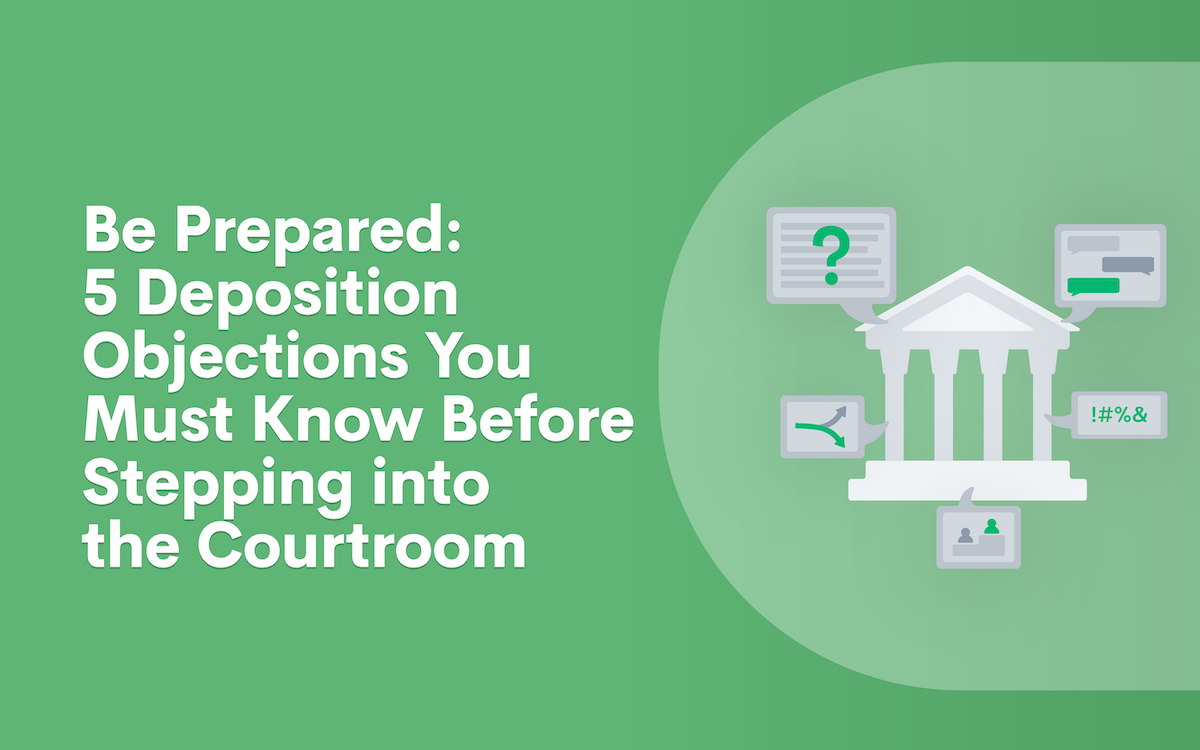Be Prepared: 5 Deposition Objections You Must Know Before Stepping into the Courtroom

The rules surrounding depositions can be enough to send new lawyers into a cold sweat. Depositions are a critical tool for building a case, and as such, it is essential for attorneys of all skill levels to be well-versed in the various objections that can arise during the course of a deposition. While some objections are straightforward, others can be more nuanced and require a deep understanding of the legal system. And not all objections applied in court are allowed in a deposition, which can be another source of anxiety.
In this blog post, we will discuss five key deposition objections that every attorney needs to know. Whether you are a seasoned litigator or a new attorney, these objections are essential to understand in order to effectively represent your clients. We will explore each objection in depth, providing examples of when each objection might be appropriate and the legal justification behind it. By the end of this post, you will have a better understanding of these key deposition objections and be better equipped to navigate the deposition process.
Asked and answered
During a cross-examination, opposing counsel may repeat the same questions framed in different ways to elicit the same answer. The objection is important because it can prevent unnecessary repetition, save time, and avoid confusion for the deponent. For example, if a deponent has already answered a question about their whereabouts on a specific date, and the opposing counsel tries to ask the same question again, the deponent's attorney can raise the "asked and answered" objection to prevent the deponent from having to repeat their answer. Conversely, an attorney may ask their own clients the same questions repeatedly hoping that the answer will be more favorably delivered than the prior answer.
Example
Attorney: “Is it true that you agreed to pay this person $20,000?”
Mr Kokoshka: “No.”
Attorney: “So, you’re saying that you don’t owe this person $20,000?”
Harassment
When it's perceived that a witness is being questioned inappropriately or in an offensive/invasive manner by opposing counsel, an objection can be raised to cease that line of questioning. If, for instance, the questions are highly personal, and they make the deponent feel uncomfortable and harassed, the deponent's attorney can raise the objection of harassment to prevent the opposing counsel from asking any more questions that could be viewed as offensive or invasive. This objection is important because it helps maintain a professional and respectful environment during the deposition, and protects the deponent from unfair or improper questioning. If the behavior continues following the objection you may have the right to end the deposition altogether.
Example
Attorney A: "So, Ms. Smith, can you tell me if you're currently dating anyone?"
Ms. Smith: "I don't see how that's relevant to this case."
Attorney A: "I'm just trying to get a sense of your personal life, that's all."
Ms. Smith: "I'm sorry, but I don't feel comfortable answering that question."
Attorney A: "Well, I'm going to ask it anyway. Are you single or in a relationship?"
Attorney B (raising the objection): "Objection, counsel. That question is harassing and irrelevant to this case."
Privilege
If a question seeks information that is protected by a legal privilege, such as attorney-client privilege or physician-patient privilege, the attorney can object to prevent the deponent from answering the question. This objection helps maintain the confidentiality of sensitive information, and can prevent the waiver of important legal privileges. For example, let's say that during a deposition, opposing counsel asks a deponent a question about a conversation they had with their attorney regarding the case. The deponent's attorney can raise the objection of privilege to prevent the deponent from answering the questionWhenever a privilege objection is made, you must instruct your client not to answer. Because it is privileged information, they are not required to answer.
Example
Attorney A: "Can you tell me what you and your attorney discussed about this case in your last meeting?"
Ms. Ripley: "I'm sorry, but I can't answer that question."
Attorney A: "Why not?"
Attorney B (raising the objection): "Objection, counsel. The question seeks information that is protected by attorney-client privilege."
Relevance
During a deposition, a lawyer may object to the relevancy of a question, should the questioning stray too far from the case at hand. In most cases, asking an off-topic question is a tactic used to shed negative light on a witness's character. This objection is important because it helps save time and keep the deposition focused on the relevant issues, and prevents attorneys from going on tangents about irrelevant topics. Note: not all courts allow relevancy objections during depositions unless the question is blatantly intended to harass or otherwise humiliate.
Example
Attorney A: "What's your favorite ice cream flavor?"
Mrs. Vito: "I don't see how that's relevant to this case."
Attorney A: "I'm just making conversation. You can answer the question, can't you?"
Attorney B (raising the objection): "Objection, counsel. The question is not relevant to the case at hand."
Form
During a deposition you can object to the form of a question. This objection is like a referee in a game of football, making sure that the rules are being followed and the game is played fairly. If a question is unclear or improperly worded, the attorney can object to prevent the deponent from answering it. This objection is important because it ensures that the questioning is fair and understandable, and prevents attorneys from asking confusing or misleading questions.
Example
Attorney A: "Have you ever not not worked for this company?"
Mr. Tomasi: "I'm sorry, I don't understand the question."
Attorney A: "It's a simple yes or no question. Have you ever not not worked for this company?"
Attorney B (raising the objection): "Objection, counsel. The question is unclear and confusing."
Tips for preparing for your deposition
When it comes to a deposition, preparation is your best defense. And although some law schools may offer litigation training, there is not a lot of time dedicated to deposition training. Yet, civil litigators spend more time in depositions than in trials. That's why, it's important that you go in ready.
Prepare your client
Your client is the most important part of your preparation. Each lawyer has their own unique set of deposition rules that they offer their clients. Yet in most cases it all comes down to the same basic things.
- Keep Answers Short
- Be Truthful
- Carefully reflect before answering
- Don’t get overly emotional
Give your client a rundown on what kind of body language and behavior is useful, and what could be harmful. They should know that they should never volunteer any information unless it's directly asked. Teach them the proper language to use like direct answers instead of “maybe” and above all, tell them that it's okay to ask that a question be rephrased if they don't understand.
Be confident
It's easy to become overwhelmed during your first few depositions. Remember, the best defense is a good offense. Anticipate any objections by listening closely to the witness's testimony. Review any and all documents and facts and go in armed with knowledge. Remember, even though you may be sweating bullets during your first deposition, it won’t always be this way. The more experience you have the easier it will get, but in the meantime muster all the confidence you can.
Protect your client
Remember, while defending a deposition you're also simultaneously defending your witness. Protect your witness by keeping them comfortable. They may get overly fatigued, thirsty, hungry, or even too hot or cold. Give them whatever they need to stay comfortable to deliver the best possible deposition. Remember, the opposing counsel will likely try to make your witness as uncomfortable as possible, and it's your job to be ready for it.
Study thoroughly
Besides knowing the case details, you should also reexamine any additional facts that could require more development through the testimony. Consider your strategy, and use your theory as a guide to forming the questions you plan on asking.
Keep it short
It’s best to avoid writing out extensive questions. Create a bulleted list of brief questions and statements. By keeping your questions short you'll be able to get the most out of your witness. Long drawn out questions will only bore and fatigue your witness, so keep it light, brief, and to the point and it will flow more like an actual conversation.
Know The Rules
Besides knowing the proper objections, you should also know the applicable court rules. For example, you should know how much time is allowed for examining witnesses, how many breaks are permitted, and the rules regarding talking with your client. It can be embarrassing going into a deposition without being familiar with the deposition rules in your jurisdiction.
Preparation is everything Lawmatics can help
As a lawyer, there is plenty to keep in mind before your deposition. The key to your success ultimately lies in preparation.
Yet depositions are only one element of being a lawyer. As an attorney an enormous amount of organization is required of you which is why you need the right tools to stay organized. It's easy to find your head spinning when there's so much at stake and so much to juggle.
Lawmatics can help you stay on top of it all. As the number one attorney-client relationship management platform Lawmatics can help your law firm with client intake, CRM, and marketing. If you're ready to see Lawmatics in action, schedule a demo today.


